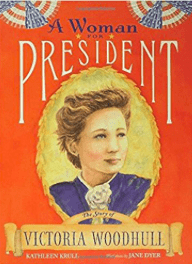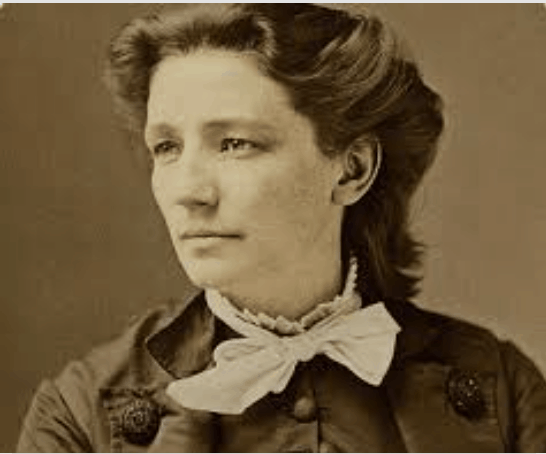Why is a woman to be treated differently? Woman suffrage will succeed, despite this miserable guerilla opposition. [Victoria Woodhull]
In 1870, the New York Herald published a letter to the editor written by Victoria Claflin Woodhull, announcing her candidacy for President of the United States. Woodhull was technically not eligible to run for president as she was only 34 years old and not the constitutionally required 35 years of age. However, no one seems to have questioned this, apparently because her candidacy was never taken seriously
Further complicating her run for president was the fact that few women could vote for her in the late nineteenth century. At that time only women voters in Wyoming and Utah were able to vote in national elections. (The right in Utah would later be rescinded.)
Victoria Woodhull, her sister Tennessee, and their eight siblings grew up in poverty and received little formal education. In order to provide for themselves financially, the two sisters traveled as clairvoyants and faith healers. They came to the attention of Cornelius Vanderbilt, who distrusted doctors, and the sisters won his devotion. He financed the establishment of a stockbroker firm in their names that was very successful, even during a downturn in the economy. They were perhaps the first women to run a stockbroker firm, but they never received a seat on the New York Stock Exchange. It would be another century before that occurred.
Woodhull was active in the women’s suffrage movement until Susan B. Anthony dismissed her and her sister as “lewd and indecent,” probably for advocating free love. Before Woodhull fell out of favor she testified before a congressional committee, arguing that the Fifteenth Amendment, which defined citizenship, was adequate proof that women should have the right to vote, just as black men did. She was the First Woman to petition Congress in person.
Woodhull’s activism propelled her to run for President of the United States. She helped found the Equal Rights Party, which nominated her to run for president and Frederick Douglass to run for Vice President. There is no record that Douglass accepted the nomination. He did not attend their convention and worked for Grant’s re-election.

In the same year Woodhull and her sister Tennessee Claflin began publication of a newspaper, the Woodhull & Claflin’s Weekly. Its main purpose was to advocate for Woodhull’s presidential candidacy. Shortly before the election the paper published an article about an affair between the renowned minister Henry Ward Beecher and Elizabeth Richards Tilton. The affair had also been published in other papers, but Woodhull’s explicit language offended some and a few days before the election she was arrested on charges of indecency. Since she was incarcerated, she could not attempt to vote on Election Day.
The outcome of the election? Some say Woodhull received no votes. It is true she received no electoral votes but, since the votes for her were not counted, it is hard to know how many she received. At least one man from Texas admitted he had voted for her as a protest vote against Grant.
The Woodhull and Claflin’s Weekly continued to publish for a full six years, espousing controversial topics like sex education, short skirts, free love, licensed prostitution, and even the radical practice of vegetarianism. It is credited with printing the first English translation of Karl Marx’s Communist Manifesto.
When Cornelius Vanderbilt died, the family paid Victoria and Tennessee a significant sum of money to leave the country. They moved to Britain where Victoria married her third husband. She lectured, published a magazine, built a village school and advocated for education reform. Victoria lived to the age of 88, after spending more than half of her life as an expat.


A very timely post!